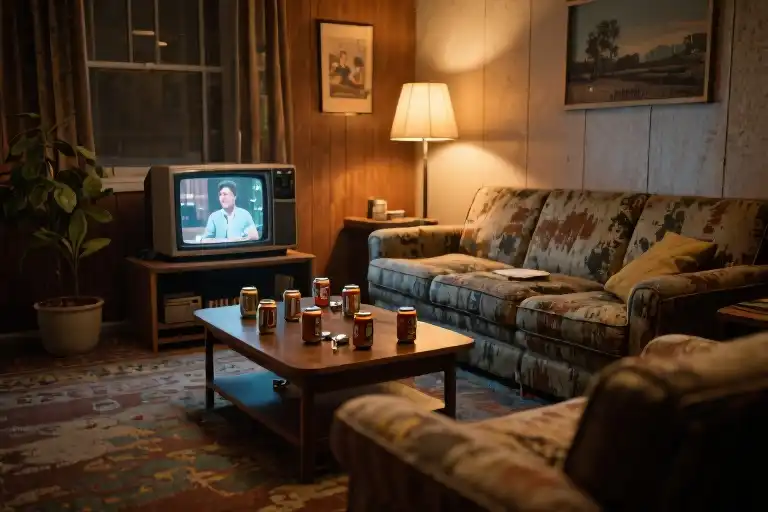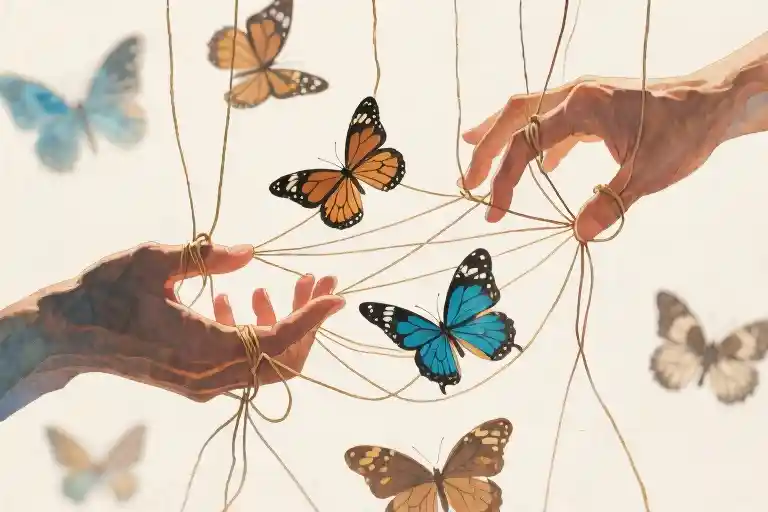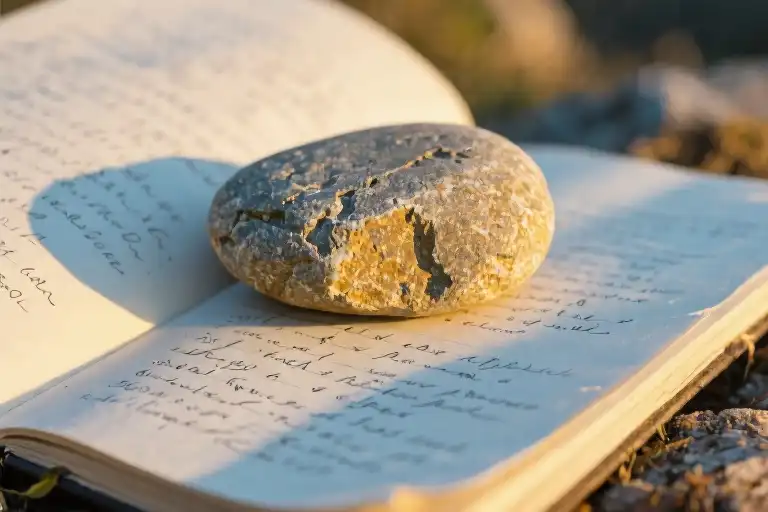I want you to know this first – I don’t hate you. There’s no secret resentment brewing beneath these words, no unspoken accusations waiting to surface. This isn’t that kind of goodbye.
The truth is simpler and more complicated all at once: you left because staying had started to hurt more than leaving. We built something beautiful once, a space where our hearts could meet halfway. But hearts keep growing even when relationships don’t, and one day you realized yours needed more room than we’d made.
I remember the exact moment I understood. Not when you packed your bags, but weeks earlier – that Tuesday evening when we sat across from each other at our usual café. Your fingers traced the rim of your coffee cup while mine grew cold untouched. We’d run out of things to say that didn’t taste like exhaustion. The silence between us wasn’t comfortable anymore; it had become the quiet of two people measuring what was left to give.
That’s when I knew what was coming. Not because either of us stopped caring, but because we’d started caring about different versions of ourselves – the people we were becoming rather than the people we’d been when we fell in love.
The black coffee I drink alone now tastes different. Sharper, more present. Some mornings I catch myself staring at the empty chair across the table, not with longing but with a strange gratitude. That space holds all the unspoken truths we finally honored by letting go.
People will call it a gentle breakup, this quiet undoing of our promises. They’re not wrong. There’s violence enough in the world without creating it between two people who once knew each other’s hearts so well. If love can grow like sunlight through leaves, it can also fade like daylight – not suddenly, but gradually, until you notice the shadows have changed shape.
What I’m learning now is how to hold this ending without crushing it in my grip. How to miss you in small, manageable ways – when a certain song plays in grocery stores, when I pass the bakery where you always bought croissants on Sundays. The ache comes differently these days: not as a storm but as afternoon rain, predictable and passing.
This isn’t about closure. That word suggests something can be neatly packed away, when what we’re really doing is learning to carry what remains differently. My hands are full with the present now, and strangely lighter for it.
The bed doesn’t feel too big anymore. The phone doesn’t feel too quiet. These are ordinary miracles no one prepares you for – how absence gradually reshapes itself into space, how solitude becomes its own kind of companionship.
If you ever wonder whether I regret letting you go without protest, know this: watching someone choose themselves is its own painful gift. It taught me how to do the same.
When the Heart Outgrows the Space We Built
There comes a moment when the architecture of love becomes too small for the people living inside it. The walls we once painted together start to feel like they’re pressing in, the windows we installed to let in light now cast shadows we can’t ignore. This isn’t betrayal, nor failure – it’s simply what happens when two hearts grow at different speeds.
Traditional breakup narratives would have us believe all endings require villains and victims. They demand dramatic last acts with shattered dishes or tearful airport chases. But the quiet dissolution of something that once fit perfectly? That’s harder to explain to friends over brunch. There’s no satisfying storyline when the truth is we both showed up every day until the space between us accumulated more weight than the connection.
What they don’t tell you about gentle breakups is how the symptoms manifest. Not in explosive fights, but in the way your coffee order changes from ‘whatever they’re having’ back to ‘black, no sugar.’ Not in slammed doors, but in the extra thirty seconds you both spend staring at your shoes before getting into separate cabs. The diagnosis isn’t infidelity or apathy – it’s something far more ordinary and far more terrifying: two people realizing their emotional circulatory systems can no longer share oxygen.
This ‘bilateral exhaustion’ (as I’ve come to call it) leaves peculiar scars. Unlike wounds from clean cuts, these marks resemble stretch marks – evidence of skin that tried desperately to accommodate growth until the tension became unsustainable. The ache isn’t sharp, but deep and diffuse, like muscle memory for a dance you’ve unlearned.
I’ve started recognizing the signs in other couples now – that subtle rearrangement of personal space when they sit together, the way their laughter arrives half a beat too late. Sometimes I want to whisper: “It’s okay if your heart needs more room than this relationship allows.” But we’re not taught to honor that kind of honesty. So we keep pretending the walls aren’t buckling until the whole structure collapses under the weight of our politeness.
What makes these endings particularly disorienting is how love persists even as compatibility fractures. You’ll find yourself missing their weird toothpaste habits while simultaneously dreading their Sunday morning playlists. The grief comes in waves that don’t follow any predictable tide tables – one moment you’re fine sorting through old photos, the next you’re undone by finding their favorite cereal still in your cabinet.
Perhaps this is why we invented the concept of closure. The idea that we could neatly package up years of intertwined lives with one final conversation or symbolic gesture. But the truth is messier. Healing from a gentle breakup isn’t about finding answers – it’s about making peace with the questions that will always hang in the air between you, like dust motes in abandoned rooms.
Here’s what I wish someone had told me: Growth isn’t always a shared project. Sometimes loving well means recognizing when your roots need different soil. And that space where your relationship used to live? It doesn’t disappear – it becomes the place where you learn how much stretching your heart can endure.
The Practice of Letting Go Without Closure
We’ve been conditioned to believe that every ending needs resolution—that final conversation where both parties nod in understanding, the neatly tied bow on a relationship’s gift box. But what if some stories simply stop mid-sentence? The modern obsession with closure often does more harm than the original wound, turning natural grief into a self-inflicted purgatory of ‘what ifs’ and rewritten histories.
Psychological studies reveal our brains treat unfinished emotional business like an unresolved math problem—the Zeigarnik effect keeps replaying incomplete scenarios on mental loop. This explains why we compulsively revisit texts or imagine hypothetical confrontations. Yet in mature breakups where no villain exists, this mechanism misfires. There’s no betrayal to dissect, no grand misunderstanding to clarify—just two people recognizing their growth has diverged beyond reconciliation.
“You don’t have to be sorry for choosing yourself” isn’t just poetic leniency; it’s neurological first aid. The apology impulse stems from societal wiring that equates relationship endurance with virtue. We’ve internalized the false equation that longevity = success, when sometimes the most loving act is releasing someone to their becoming. Therapist Esther Perel observes that modern relationships often end not from lack of love, but from irreconcilable life directions—what she terms ‘parallel lives syndrome’.
Consider the Japanese art of kintsugi, where broken pottery gets repaired with gold lacquer. The fractures aren’t hidden but highlighted as part of the object’s history. Similarly, accepting relational incompleteness allows the cracks to become part of your personal patina rather than flaws demanding invisible mending. This mindset shift transforms “Why didn’t we…” into “This is how we…”—a subtle grammatical adjustment with profound emotional consequences.
Morning rituals become the proving ground for this philosophy. That first sip of black coffee alone—bitter yet clarifying—serves as daily evidence that solitude and wholeness can coexist. The absence of a good morning text gradually stops feeling like missing data and becomes simply…morning. These micro-adjustments rewire neural pathways faster than dramatic gestures; neuroscientists confirm that small, consistent behavior changes create more durable emotional shifts than cathartic one-off events.
Perhaps closure isn’t something we receive but something we cultivate—like brewing that single cup with deliberate attention instead of waiting for someone to bring it to us. The French have a phrase, ‘l’appel du vide,’ describing the inexplicable urge to jump when standing at heights. Similarly, there’s comfort in recognizing that some relational endings contain their own quiet logic, even when our impulse is to clutch at explanations. The space between ‘I understand’ and ‘I accept’ is where genuine healing begins—not with a period, but with an ellipsis…
The Arithmetic of Black Coffee
Healing isn’t measured in grand gestures or dramatic breakthroughs. It’s counted in the quiet moments when your hands don’t shake pouring that first bitter cup. When the steam rises alone into morning light that no longer feels accusatory. This is how we take inventory of survival – not by the absence of pain, but by its gradual demotion from overwhelming force to manageable background noise.
The Evidence List
- Monday 7:15 AM – Drank coffee without imagining your commentary on the roast
- Thursday 9:42 PM – Your favorite song played and I didn’t rewrite the lyrics in my head
- Second Sunday – Noticed the silence between birdcalls before noticing your absence
These tiny calibrations form what psychologists call ‘ordinary healing’ – the unspectacular daily proofs that neural pathways are rerouting themselves. The microwave clock blinking 12:00 becomes more relevant than the last time you called. Your shampoo scent lingering in the bathroom stops being a landmine and becomes simply a fact.
The Survival Value of Small Missing
That twinge when passing our old brunch spot? It’s not regression – it’s your emotional immune system doing maintenance. Like phantom limb sensations reminding amputees of what was, these micro-misses serve evolutionary purpose:
- They confirm the relationship mattered enough to leave traces
- They provide controlled exposure therapy (three-second ache, then exhale)
- They demarcate healed territory (“This hurts 20% less than last month”)
Neuroscience shows it’s precisely these minor recurrences that help the brain update its prediction models – proof you can encounter triggers without system collapse.
The New Math of Forgetting
Here’s the paradox no one mentions: true forgetting isn’t erasure, but the acquired ability to let memories pass through without snagging. Like learning to swallow pills – the physical object remains, but stops choking you.
My coffee ritual charts this progression:
| Phase | Taste Perception | Hand Temperature | Steam Interpretation |
|---|---|---|---|
| Week 1 | Ashes | Always cold | Ghost breath |
| Month 2 | Bitter but familiar | Neutral | Just water vapor |
| Yesterday | Complex, almost good | Warm | Morning companion |
This is how we build the new skill of ‘forgetting to ache’ – not through amnesia, but through repeated proof that the world continues offering textures beyond loss. The cup warms your palms regardless of who isn’t there to share it. The coffee’s acidity reveals floral notes you’d never noticed before. Small astonishments begin outweighing old sorrows.
Eventually, you’ll catch yourself mid-afternoon, startled by how long it’s been since you converted experiences into mental messages to someone who’s no longer listening. That’s not betrayal – it’s the merciful arithmetic of healing. Each unshared thought another quiet step toward the mysterious mathematics where missing becomes simply remembering without urgency.
The Arithmetic of Letting Go
The coffee tastes different now. Not worse, not better—just unmistakably solitary. That first sip used to carry the weight of your morning voice, the way you’d hum off-key while scrambling eggs. Now it’s just bitter beans and hot water, a liquid measurement of how far I’ve come. This is what healing looks like in its ordinary costume: a clean mug with no lipstick smudges, a kitchen window that frames sunlight instead of your silhouette.
Memory has a peculiar way of calcifying around absence. What began as a gaping wound has settled into these small, bearable hollows—the extra blanket folded at the foot of the bed that no longer gets used, the Spotify playlist I finally deleted last Tuesday. You exist in my life now as a series of subtractions, each one carving out more room for this new, quieter version of happiness.
Sometimes I catch myself rehearsing conversations we’ll never have. In the shower, driving home from work, those liminal spaces where the mind wanders without permission. I imagine telling you about the barista who remembers my order now, or the way the maple tree outside my apartment has grown crooked since you left. These phantom dialogues used to leave me breathless, but lately they dissolve like sugar in hot tea—sweetness diffusing into nothingness.
There’s freedom in this unclenching. Like learning to hold a wineglass by the stem instead of clutching the bowl; the same action, but with less warmth transferred, less fingerprints left behind. I no longer check the weather in your city or wonder if you kept the bookshelf we assembled together. The mystery of your daily life has become just that—a mystery I no longer feel compelled to solve.
If you walked into this coffee shop right now, I wouldn’t need to say “I don’t hate you.” It would be evident in the way I’d smile without leaning forward, how my hands would stay wrapped around my cup instead of reaching. The truest closure isn’t some dramatic confrontation—it’s the accumulation of these microscopic moments where your ghost stops haunting my reflexes.
Maybe someday I’ll forget to remember the exact shade of your laughter. Perhaps your birthday will pass without my fingers twitching toward my phone. These aren’t betrayals, just the natural erosion that comes with living fully in my own skin again. The ache has become a language I’m slowly unlearning, one silent morning at a time.
So here’s to black coffee and unmade beds, to all the ordinary things that once felt like relics of war and now simply are. This is how gentle goodbyes work—not with slamming doors, but with countless tiny surrenders that eventually add up to peace.





